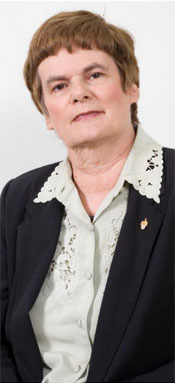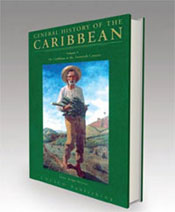 |
 |
 |
|
November 2009
|
UNESCO, Histories and UWI
Representing the History of the Caribbean series was Professor Bridget Brereton of the St Augustine campus, along with Sir Roy Augier of Mona, and Professor Franklin Knight of The Johns Hopkins University, Baltimore. It seems fair to say that UWI historians have played a very large role in the six-volume work. Four of the six volume editors are closely connected to UWI: Knight, editor of Volume 3, is a Jamaican Mona graduate and a recent (2007) recipient of our honorary degree; the editor of Volume 4, taking over on the death of the Cuban historian Manuel Moreno Fraginals, is St Augustine Professor Emeritus Keith Laurence; Barry Higman, for many years based at Mona, edited Volume 6; and Brereton is the editor of Volume 5, as well as the author of chapters in Volumes 4 and 6. Many UWI people wrote chapters for the series, including St Augustine’s Kusha Haraksingh, Keith Laurence, Brinsley Samaroo and Kelvin Singh. And Augier, Professor Emeritus at Mona, and a former Pro-Vice-Chancellor, is the President of the Scientific Committee which has overall supervision of the series. The History of the Caribbean, like the other series, aims to present current scholarly knowledge on the region’s past, for a readership mainly conceived as University students and the intelligent general public. It is also designed as a work of reference. Defining the region in the broadest possible sense, it offers a genuinely pan-Caribbean perspective, and its authors are all specialists in the history of the pre-Columbian, colonial and postcolonial periods, and of all the territories whatever European language they may currently speak. Five of the six volumes are out and the last one, Volume 4, is in press and will appear early in 2010. The Paris meeting was partly to ‘big up’ the different Histories, and to celebrate their completion or near completion— planning for some began as long ago as the 1960s. But the more substantive agenda had to do with the next steps for the Histories: how to disseminate them more widely; how to market them better; how to produce versions in different media for a wider and younger constituency.
|

 In early October, UNESCO summoned a group of historians to a meeting at its headquarters in Paris to discuss the general and regional history series which UNESCO has sponsored, starting in the 1960s. There are six of these ambitious, multi-volume series: The History of Humanity; The General History of Africa; The History of Civilisations of Central Asia; The Different Aspects of Islamic Culture; The General History of Latin America; and The General History of the Caribbean.
In early October, UNESCO summoned a group of historians to a meeting at its headquarters in Paris to discuss the general and regional history series which UNESCO has sponsored, starting in the 1960s. There are six of these ambitious, multi-volume series: The History of Humanity; The General History of Africa; The History of Civilisations of Central Asia; The Different Aspects of Islamic Culture; The General History of Latin America; and The General History of the Caribbean. With respect to the History of the Caribbean, which is in English only, translating the volumes into Spanish and French was clearly essential. More people in the Caribbean speak and read Spanish and French than English; and the pan-Caribbean conception and design of the series are undermined when the publication is in only one regional language. Sadly, it became clear that UNESCO could not currently fund this project, and that it would be necessary to find a ‘partner’ who could sponsor the translations, and the publication of the translated versions. Plans are in train for producing a ‘youth-friendly’, video version of the History, and it is hoped that funds may be raised for a three-part series of one-hour film documentaries.
With respect to the History of the Caribbean, which is in English only, translating the volumes into Spanish and French was clearly essential. More people in the Caribbean speak and read Spanish and French than English; and the pan-Caribbean conception and design of the series are undermined when the publication is in only one regional language. Sadly, it became clear that UNESCO could not currently fund this project, and that it would be necessary to find a ‘partner’ who could sponsor the translations, and the publication of the translated versions. Plans are in train for producing a ‘youth-friendly’, video version of the History, and it is hoped that funds may be raised for a three-part series of one-hour film documentaries.